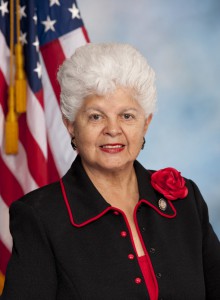
Brenda K. Wiederhold: You recently received an award from the National Association of County Behavioral Health and Development Disability Directors for your outstanding efforts to reduce cuts to national mental health programs. Upon receipt of this prestigious honor, you said, “Mental health continues to be a critical issue that does not receive the attention or financial support it deserves.” Firstly, can you please discuss how we can go about changing this?Grace Napolitano: All of us in the mental health community have to devote more energy to networking and working together instead of just working in our own worlds, because there’s power in numbers. Once we have a solid foundation we can all support, we will be able to get more attention for mental health.
BKW: As the head of the Congressional Mental Health Caucus, you have a history of supporting and hosting congressional briefings on children’s and veterans’ mental health and suicide prevention. Can you please discuss why you feel these particular issues are in need of attention?
GN: Mental health has been an issue that we, as a country, have not given our attention to, because the stigma makes many people afraid to raise the topic. For example, the need for mental health services in our military was ignored for decades, dating from the Vietnam War and before. We are only just beginning to understand that we have a responsibility to provide services and assist our veterans and their families with becoming as functional as possible when they have been affected by the trauma of war. Similarly with our young people, children don’t vote, and their families sometimes do not speak up for them because of stigma. This is a shame, because childhood is often when we can do the most good by treating mental health issues.
BWK: You successfully introduced the Mental Health in Schools Act in an attempt to catch potentially serious mental illnesses earlier in life. Can you please discuss how you foresee this legislation improving the lack of awareness and available information on mental health?
GN: The Mental Health in Schools Act creates grant funding so that more schools will be able to partner with nonprofits and provide mental health services for students. When schools have an on-site professional, that person can see when a child is suffering from mental health issues and guide them to treatment. Because youth who are treated early are less likely to get involved with crime, drug use, imprisonment, suicide, and other social problems, preventing these tragedies also ultimately saves money for the taxpayer.
BWK: The national suicide rate currently far exceeds the homicide rate. Do you think we could do something to slow suicides in this country?
GN: Definitely. First, we must reduce the stigma associated with mental health. Second, we must make teachers, social workers, military officials, and everyday people aware of the warning signs of suicide. Finally, we must support mental health services and make them available, so we can ensure that a suicidal person gets help.
BKW: Do you think rising rates of PTSD have contributed to this increase?
GN: As you know, the U.S. military currently loses 25 soldiers to suicide for every one lost in combat. We must provide state-of-the-art treatment for our troops and vets, and provide professionals who can determine the level of posttraumatic stress and the right course of treatment.
BKW: Can you please speak to the ways in which you feel advanced technologies can improve healthcare?
GN: Technology can play a critical role in providing new therapies and treatment. We have seen many new advances in mental health treatment in recent years, and we need to continue encouraging that trend at the federal level.
BKW: What do you think we should do to move this mental health research forward?
Fund it! Because of the stigma, few people want to deal with the issue or give it the financial support it deserves. We have to change this attitude and provide more funding for mental health.
BKW: What are you most proud of in your career?
GN: I am glad that I was able to begin opening the doors and shedding a little light on an issue that so often goes ignored. When I brought back the Congressional Mental Health Caucus in 2003, we had very few members of Congress who were on board. We have grown bigger every year, and I am encouraged by the increase in interest from my fellow members of Congress. They are beginning to see that mental health is not something to be afraid of, and that it is a critical part of our overall health and wellbeing.
BKW: Any predictions on new trends for technology & healthcare for the next decade?
GN: I believe we will see more openness to new technology and more acceptance of mental health as a priority issue in the coming years. To what degree will largely be determined by how effectively we in the mental health community can work together.
BKW: Do you feel most people are willing to embrace new technologies?
GN:Like anything else, it takes time to accept new methodologies and technologies. But with up-and-comers making new technological advances all the time, both here and abroad, I think the outlook is improving.
BKW: Anything you’d like to add?
GN: Make advocacy a priority. Reach out to your association, your local elected officials, and make your voice heard. It is only by working together that we will be able to make significant progress on mental health.
 About Brenda Wiederhold
About Brenda Wiederhold
President of Virtual Reality Medical Institute (VRMI) in Brussels, Belgium.
Executive VP Virtual Reality Medical Center (VRMC), based in San Diego and Los Angeles, California.
CEO of Interactive Media Institute a 501c3 non-profit
Clinical Instructor in Department of Psychiatry at UCSD
Founder of CyberPsychology, CyberTherapy, & Social Networking Conference
Visiting Professor at Catholic University Milan.
Facebook • Twitter • Google •
Written by Brenda Wiederhold
President of Virtual Reality Medical Institute (VRMI) in Brussels, Belgium.
Executive VP Virtual Reality Medical Center (VRMC), based in San Diego and Los Angeles, California.
CEO of Interactive Media Institute a 501c3 non-profit
Clinical Instructor in Department of Psychiatry at UCSD
Founder of CyberPsychology, CyberTherapy, & Social Networking Conference
Visiting Professor at Catholic University Milan.
Read other posts by Brenda Wiederhold →







